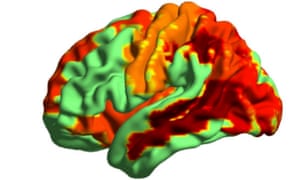Brain scans have revealed the first evidence for what appears to be a heightened state of consciousness in people who took psychedelic drugs in the name of science.
Healthy volunteers who received LSD, ketamine or psilocybin, a compound found in magic mushrooms, were found to have more random brain activity than normal while under the influence, according to a study into the effects of the drugs.
The shift in brain activity accompanied a host of peculiar sensations that the participants said ranged from floating and finding inner peace, to distortions in time and a conviction that the self was disintegrating.
Researchers at the University of Sussex and Imperial College, London, measured the activity of neurons in people’s brains as the drugs took hold. Similar measurements have shown that when people are asleep or under anaesthetic, their neurons tend to fire in a more predictable way than when they are awake.
“What we find is that under each of these psychedelic compounds, this specific measure of global conscious level goes up, so it moves in the other direction. The neural activity becomes more unpredictable,” said Anil Seth, a professor of neuroscience at the University of Sussex. “Until now, we’ve only ever seen decreases compared to the baseline of the normal waking state.”
The research, published in the journal Scientific Reports, appears 74 years to the day after the Swiss chemist Albert Hoffman went on the world’s first LSD trip. In one of the most terrifying examples of self experimentation in the annals of science, Hoffman ingested 250 micrograms of lysergic acid and had to be helped home on his bicycle by his lab assistant. After a local doctor reassured Hoffman that he was not about to die, the scientist began to enjoy himself, writing later about fantastic images surging in on him and “exploding in coloured fountains.”
The scans found the most notable effects in parts of the brain that are known to be important for perceptions, rather than other roles such as language and movement. And while it is unclear how the change in brain activity affects consciousness, the result is what the scientists expected.
“I think people would have the intuitive idea that their experience on psychedelic compounds is a bit more random, a bit less constrained, that there’s a mixing of the senses, and all kinds of connections that are experienced between things that are previously unconnected,” Seth said.
Robin Carhart-Harris, a researcher at Imperial College who took part in the study, said the sudden increase in randomness in brain activity appeared to reflect a deeper and richer conscious state.
“People tend to associate phrases like ‘a higher state of consciousness’ with hippy speak and mystical nonsense. This is potentially the beginning of the demystification, showing its physiological and biological underpinnings,” he said. “Maybe this is a neural signature of the mind opening.”
Beyond confirming what scores of hippies learned more than 40 years ago, the research could help scientists to understand what neural activity corresponds to different levels of consciousness in humans. Another hope is that by understanding how people respond to the drugs, doctors can more accurately predict which patients might benefit from having psychedelic drugs to treat mental disorders, such as depression.
Carhart-Harris was among researchers who published a small trial last year into the use of psilocybin to treat serious depression. The results were promising, but more studies are needed before the compound can be considered for treatment, and the scientists warned people off picking magic mushrooms to treat their condition.
“The evidence is becoming clear that there is a clinical efficacy with these drugs,” said Seth. “We might be able to measure the effects of LSD in an individual way to predict how someone might respond to it as treatment.”


No comments:
Post a Comment